The door is always open at De Mazenod Door
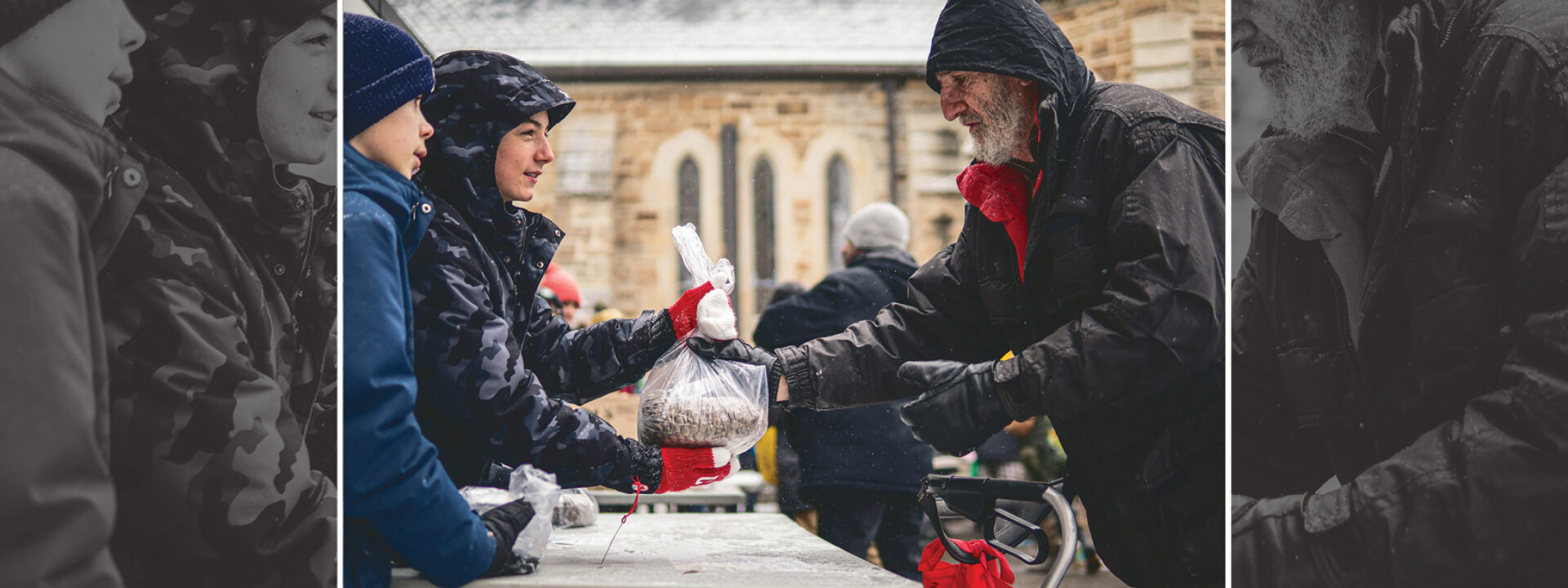
St. Patrick’s Church street outreach in downtown Hamilton is helping those in deep need each and every day with homemade meals, kind words and even a home to call their own.
It’s a bitterly cold day in January and still a long line of people forms around St. Patrick’s Church in downtown Hamilton. It is hunger that keeps people hunched over against the frigid winds as the line shuffles along – people of all ages, abilities, and health. Hundreds of Hamiltonians come to De Mazenod Door in search of food, a hot beverage, even kibble for their pets. Though the weather held steady at -8 C that day, there were dozens of volunteers from young to old standing behind tables, serving food, drinks, and bags of pet food. Among them were church members, retirees, grade 8 students from the local school, and public health staff providing vaccinations.
One woman in a toque and a bright pink coat stood to one side helping to direct and handle questions from the many people milling around. Her name is Sherri Ramirez and she has been helping to run De Mazenod Door Outreach since it was started eight years ago by Father Tony O’Dell and Father Jarek Pachocki, co-pastors of St. Patrick Parish on King Street East at Victoria Avenue North.
“There’s not a day we don’t do this. We’ve been out here in -40 temperatures,” says Ramirez, smiling broadly despite the icy wind. “Because it is our brothers and sisters who are going hungry. It builds a sense of community. Food draws people out. Hunger draws people out.”
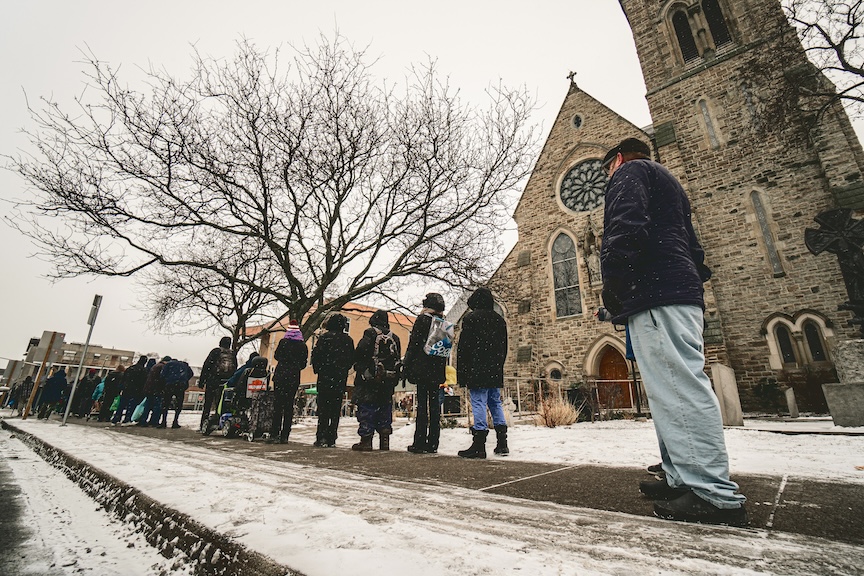
How it started
Every single day for the past eight years, breakfast and lunch has been provided – not one day has been missed even through frigid winters, summer heatwaves and a pandemic. It has been going strong since O’Dell and Pachocki started this initiative by handing out sandwiches.
They started their parish work at St. Patrick’s Church in downtown Hamilton in 2012. One of their first decisions was to remove the fence around the church, which ended up being symbolic in more ways than one.
“We felt like (the fence) was promoting a different message where our message was everyone is welcome, but that fence was a dividing line between the parish and the community,” says O’Dell.
It was one day not long after when he was asked for money by someone on the street. While he explained that he did not carry cash, he asked the man what he wanted it for.
“He said he was hungry,” recalls O’Dell. “I told him to come across the street (to the church) and we’ll make you a sandwich and can give you a banana and some coffee. Then it grew to about 20 people in the first three months.”
People were coming to the church’s office, in a small building beside St. Patrick’s Church.
“They would ring the doorbell and we made sandwiches or some food that we had,” says Pachocki. “It started growing so we thought to start preparing for the next day. On the kitchen table, we would spread five loaves of bread and prepare the sandwiches for the next day, so we were ready. I think the beginning of De Mazenod Door, in 2016, was when the (Catholic) school board came to us. We had a conversation on how we can partner the parish and the school to make a difference in the inner city.”
The school offered a classroom, with a secured door so that nobody could go into the school.
“St. Eugene de Mazenod was the founder of our religious community (Missionary Oblates). He always had the passion from the beginning 200 years ago for the poor, for the marginalized. His mission of taking care of the poor and working with the poor was very much of the heart. So, we named De Mazenod Door after him, but the concept of the door was significant as well. The door symbolizes welcome as when someone comes to your home, you welcome them as your guest at the door. That’s why we don’t call them clients, we call them our guests.”
De Mazenod Door, also referred to as the Door, registered as a charity and grew to serve 250-300 meals a day on average.
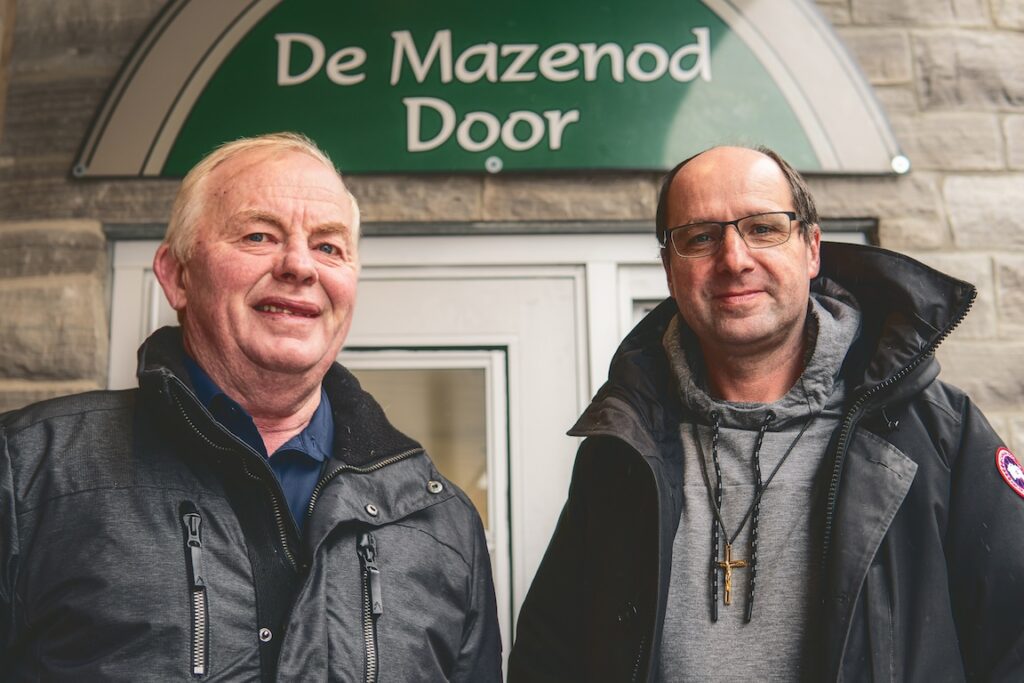
“Then came along the pandemic,” says O’Dell. “We, as a church, had to close as well but we had a big, empty church here and there’s people who need to go to the bathroom, who are freezing to death outside. So, we opened our church, we had volunteers come to help us and we had what we called a ‘resting station’. We had people sleeping in the pews, we always had hot coffee, hot chocolate, sandwiches there for them. We had people come in who help with mental health issues. Throughout that, that’s when we were breaking 500 (meals) at the end of the pandemic.”
As lockdowns lifted, it became a difficult time for some people to pay common expenses such as rent and food.
“What is surprising now is the number of young men coming,” says O’Dell. “People can’t afford it; if they must pay rent then they can’t afford food. We hear that over and over and over again. The largest number we had was in December 2023 when we topped 700 meals in one day.”
The point of offering food is to provide basic necessities to people, regardless of their situational, physical or mental health issues.
“You don’t have to be clean and sober to come,” says O’Dell. “Even in addiction they’re still human beings, they still have dignity and value, and they still get hungry like any other person would. Unfortunately, when we see addicts on the streets, automatically we’re trained in our society to make a judgment right then and there, so the person is written off before you even know what the issue is.”
“The person comes first,” adds Pachocki. “It’s important for us to listen to them. A number of times, people living on the streets haven’t heard their name spoken for years – people see them, sometimes help them here or there but nobody speaks to them by name.”
One summer, the priests decided to offer barbecue instead and it became a Friday tradition. When temperatures cooled, they assumed they would pack the BBQ away until the next season.
“When the weather started changing, we asked the people in the line, our guests, how long we should be doing barbecue,” noted Pachocki. “(They) said if it’s cold or hot out, we’re still hungry. So that was the answer, it doesn’t matter what the weather is, the person is hungry, so we feed them. We had the Friday BBQ in the winter storm, we’ve had BBQ in heatwaves. It was an eye-opener when we’re thinking the weather is bad but that’s not a concern for them. Their first concern is they’re hungry.”
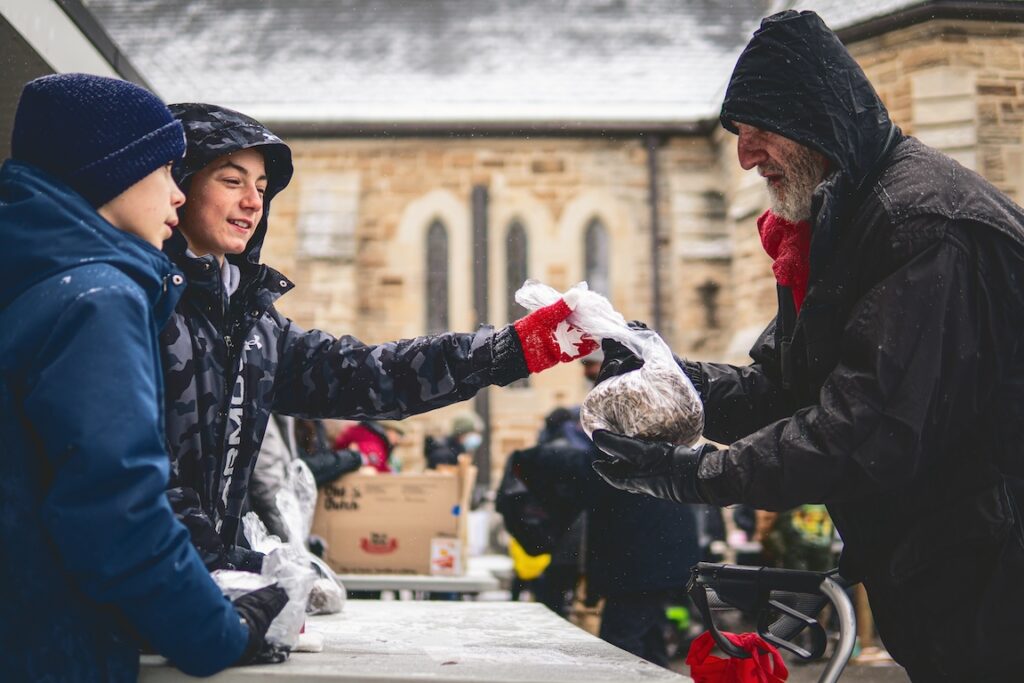
How it grew
In the past year alone, the distribution of meals increased from 500 a day to 700 meals a day. Each day has a different team of volunteers who rotate through the week, breakfast and lunch, to provide food every day.
“I knew there was a need down here. I had a friend volunteering here who enticed us to come down to volunteer,” says Jim Galvin, who has been a volunteer since he retired in 2016.
“You like to feel you’re contributing to the homeless problem,” explains Galvin when asked why he volunteers. “People are hungry. You like to feel in some small way you’re contributing. When new volunteers come here, you see it through their eyes, and they’re astounded. I think people are insulated from this and I think when people see it for the first time up close, they’re gob-smacked. People come here from homeless encampments, I’ve seen people come half-dressed, no socks in a rainstorm. I also see the number of people who volunteer to help. The volunteers are the heartbeat of this place, they’re so important.”
More volunteers and community agencies have since joined the initiative. Patrick MacCarthy, the Door’s volunteer coordinator, says there are over 100 regular volunteers on the roster, not including schools, corporations, and community organizations. Beyond providing food and beverages, they also host a vaccination clinic. As people wait for food, they can walk over to a white tent, roll up their sleeves, and receive vaccinations while there.
“It started as a fluke,” says Ramirez. “It has the highest vaccination rate of any pop-up in the city.”
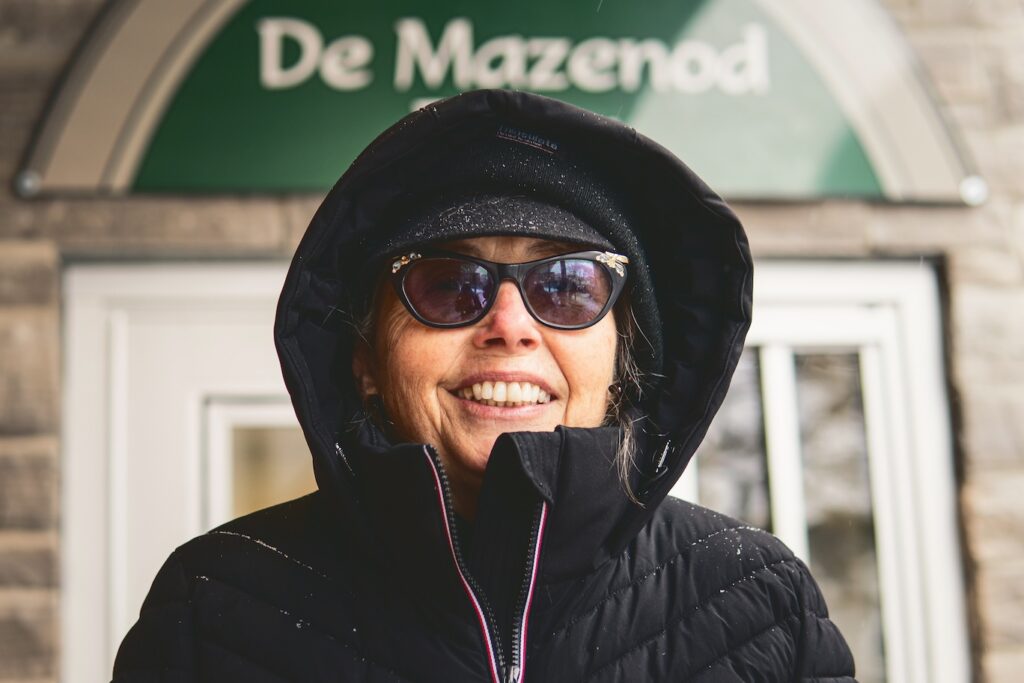
Now Hamilton Public Health Services is routinely on-site to provide vaccinations to anyone who wants them.
Paul Dobrowolski teaches at St. Patrick’s Catholic School next door to the church. He started in 2010 and witnessed how the Door grew in popularity, not just with guests but with volunteers.
“I have a unique perspective because I can look at the before and after,” he says. “I arrived here in 2010; there was a big iron rod fence around the entire church, essentially to keep people out. It started to change when Father Jarek and Father Tony arrived. I can still remember vividly looking over at the pastoral centre, which was the rectory before, and seeing someone knocking on the door and the person walked away with (food). I would see that on a consistent basis and wondered what was going on: I know now that was essentially the early days of De Mazenod Door. It very organically grew from a handful of people to 40-50 people to hundreds of people. I remember looking out my classroom and seeing Father Tony and Father Jarek standing at a BBQ flipping burgers. I was really inspired by what I saw. It allowed me to get out and started volunteering, so on my lunch, I would be assisting at the Friday BBQ.”
It wasn’t long after that the school and church partnered to increase the Door’s space for preparing food.
“In 2016, De Mazenod Door moved into the old St. Patrick’s school,” adds Dobrowolski. “De Mazenod Door was getting larger and larger and didn’t have space to accommodate everybody, so it was decided with the church and the school board to offer a space in our school which was actually the teacher’s staff room. Windows were put in with a door and that became the kitchen with volunteers working now inside the school preparing meals. It was an opportunity for our kids to get involved. It’s developing that idea of service and recognizing we all have a role to play in this.”
Soon other schools were coming to help serve food. The idea of helping this initiative grew amongst schools, including McMaster University which would send nursing students to help.
“It snowballed,” says Dobrowolski. “I used to reach out to people but now it’s the opposite where I have people calling and emailing me asking how they can be a part of this. It’s to the point now I have a waiting list, I have so many people contacting me. When you start to talk to some of these people and start to learn their stories, you develop a greater appreciation for what they’re going through and why they’re in the situation they’re in. When you start to see those stories, you understand why they’re here and the question becomes, what can we do to help?”
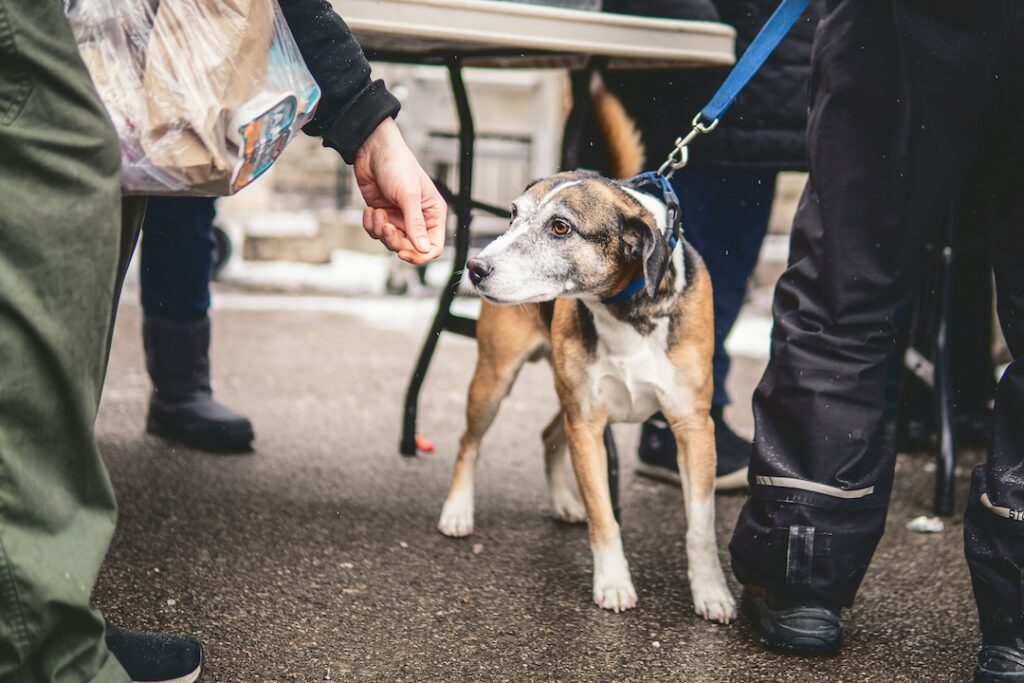
Helping with housing
When it came to their guests, O’Dell says they saw a vicious cycle in people wanting to get sober and stay sober.
“We decided to create spaces for clean and sober living. Take people from the streets and work with them, put them into a new, clean house, and put supports around them for everything they need. If they had hospital appointments, we’d get them to those appointments. We provided everything in the house for them to be successful.”
There is now a men’s house called Eugene’s Place, the women’s house is called Mary’s Ark and there are also four apartments.
They get the properties from friends, says O’Dell, people who approach them with available properties and De Mazenod Door Housing leases it, renovates it and provides anything else needed to help in the resident’s success.
“We make sure it’s going to be successful,” says O’Dell. “If they can’t afford food, for example, we will provide food. If they need cleaning materials, we will provide that. It’s to give people a hand up so they can get on their feet and hopefully move on in becoming a contributing member to their own family. When people get knocked out of housing and onto the streets, it’s really hard to make that transition because there is so much that needs to come together. We decided our housing would be packaged in such a way, it’s guaranteed success.”
One friend is Garth Brown, a business owner and philanthropist living in Oakville, who recently bought two homes in Hamilton: one for Eugene’s Place and one for Mary’s Ark. He bought the men’s house in 2020 and then, a year ago, bought a house to offer to women.
“Having a fixed address changes everything,” says Brown. “Now individuals can work on language skills, job skills, furthering their education, whatever direction they need. It’s predictability of having a home you share and a door you can lock. Things we take for granted. Most of us have a set of keys we carry around but for a lot of people getting a key to a room and a front door is the first thing they’ve had in years that suggests stability. We appreciate the real challenges everyone has gone through but we can provide them with some dignified housing at affordable rates and that helps them move forward with their lives and stabilize and go in a direction that’s right for them.”
Brown has years of experience with this as he opened a house in Kitchener a couple decades ago and one in Oakville in 2011, but he will admit to learning along the way.
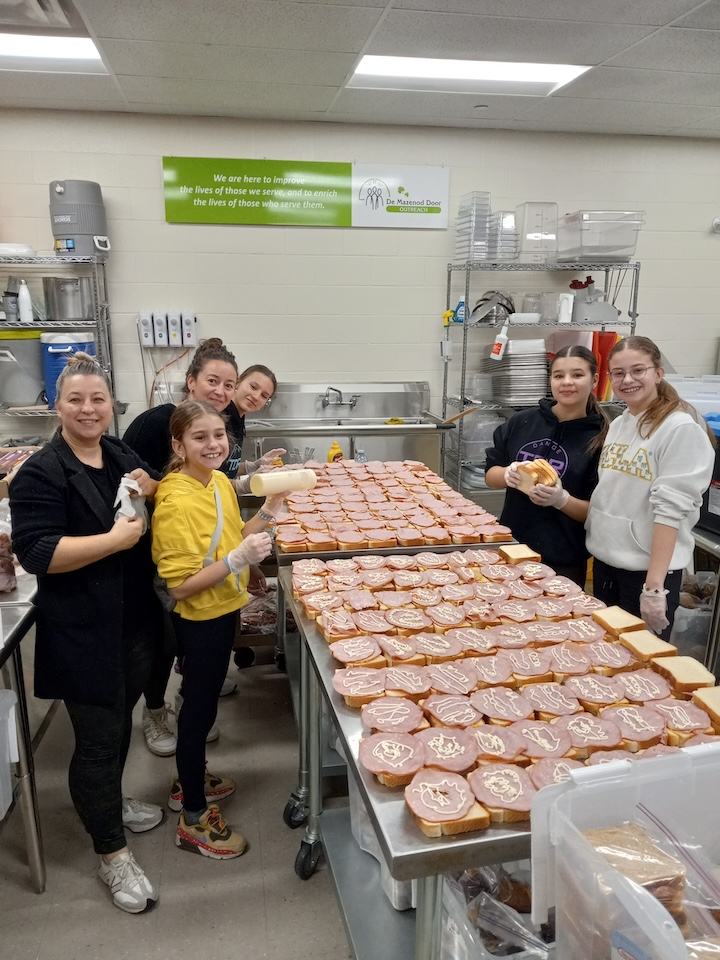
“We stumbled and fumbled our way through, but we helped a lot of women move forward in their lives and the home eventually evolved,” explains Brown. “Through that journey, you start to realize these people have stories, background, they have gone through things I would never have dreamt of and here they are, stronger than ever, trying to move forward in their lives. What can we do to set them up for success?”
Brown says he and his wife have always had a passion to help, and this is one tangible way they can.
“Growing up in the ’60s and ’70s, I didn’t see (homelessness) or, at least, I was blind to it,” recalls Brown. “Now it’s a question of what can we all do as a community, as individuals, as agencies – individually or collectively – to find ways to work together to make these spaces possible?”
Brown says they knew they wanted to expand their offer of housing to Hamilton and Bishop Douglas Crosby introduced the Browns to O’Dell and Pachocki.
“I keep learning every day how to do better and do more tomorrow,” says Brown. “We’ve helped a lot of people. A quote I heard the other day, but it’s been around for decades if not centuries, is ‘Be good to yourself by being good to others’ and that resonated because I think we can focus on our own challenges and issues, but we take into context the challenges other people are facing then we realize we got it pretty good, we’re pretty blessed. If we share those blessings and find ways to make a difference in other people's lives, then I think we are happier inside.”
Brown has since become a board member of De Mazenod Door to focus on housing solutions and invites community members with possible property opportunities to collaborate with them and be part of this movement.
“The continued outreach and support from Sherri Ramirez and the volunteers and staff at De Mazenod have made a huge difference to the people who live in the homes so I can’t thank them enough for the role they play in making every day that much brighter for everyone who lives in the properties.”
Providing a safe home
James was an executive in the call centre industry who moved to Philippines to open a new centre for his company. While there, he met his wife and started a family. Then he fell ill, had to return to Canada for healthcare, and then found himself homeless.
“My impression of homeless people was pretty low,” he says. “I would always try to avoid them. After spending time in a shelter, these homeless people – and I was one of them – everybody has a story, a reason how they wound up where we are.”
He talks about his life before he got sick when he had money to spare and spent it on luxury items, activities like golfing, taking friends for dinners. Then, in 2007, it all changed when he got an intestinal infection.
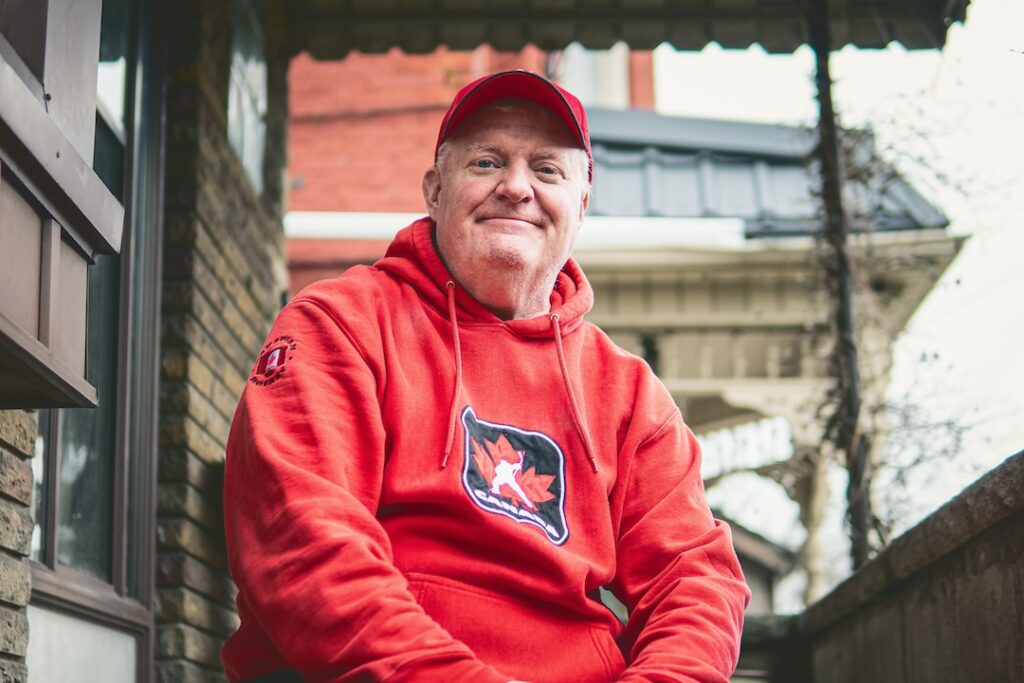
“I came back to Canada without much and moved in with a family member to get good healthcare,” recalls James. “I was fixed in three months but then I found myself without a home in Hamilton. My doctor advised me to stay out of senior management as it would wear my health down, so I got a job as a representative taking calls. I still needed to support my family back home, and I needed to look after myself here so that’s why the financial aspect became difficult, especially taking a few steps down in my career. I was OK with it, but I had to get into a shelter for six months. Then I was able to live with my niece before she moved to Edmonton, so I was back in the shelters again for another six months.”
He soon met Ramirez who offered a room in Eugene’s Place where he moved in October 2021.
“Supportive housing is not about profit,” says James. “It has been a game changer for sure, but it’s not about making money. We need more people like Garth (Brown).”
Cultivating sustainability to meet growing needs
To meet the growing demands of hunger, the Door also cultivates its own vegetables on a leased farm in Hamilton. Farming did not come naturally to the priests, who ended up with an acre of very large zucchinis in the beginning, so they had to learn when to plant and harvest.
“We’re getting better in planning,” says Pachocki. “Even last year, we were planting in waves, so tomatoes planted in one spot but, two or three weeks later, plant them again in another spot so they’re not coming at the same time.”
And even the farm is growing.
“Last year, we decided to bring home 40 chickens,” O’Dell notes with a smile. “They provide fresh eggs for breakfast twice a week here. Then we thought now we need a rooster, so we ended up with two roosters. Then we thought ‘what farm doesn’t have animals on it?’ So, last year, we went up north and we started to fill Noah’s Ark. We brought home two horses, two donkeys, two baby goats, two lambs, two piglets. We had two turkeys, but one flew the coop so now we have one turkey.”
Now they’re looking to hire a farm manager as their mission continues to expand to meet growing needs.
“It’s a wonderful place to go,” says Pachocki, adding they partner with horticulture classes in schools that come to weed, plant, and enjoy the fresh air. Volunteers and guests are often invited to the farm to get out of the city.
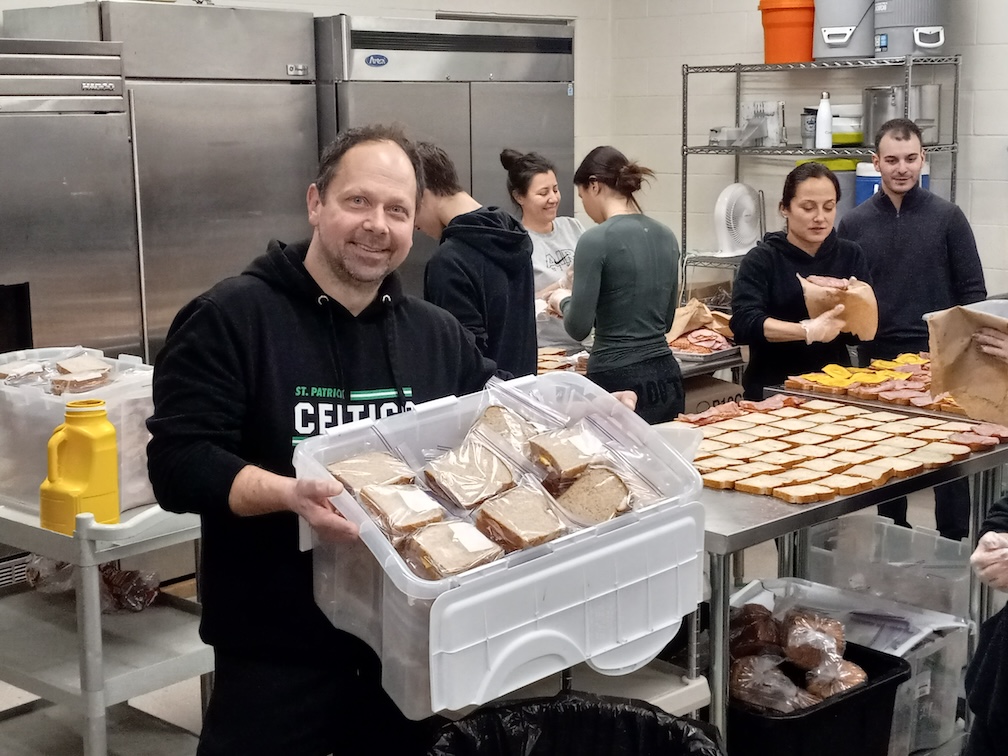
Addressing more needs
The priests say their next mission will be working with youth in Hamilton.
“Mission with Youth, the whole idea is being with young people rather than doing things for them,” says O’Dell.
“It’s seeing the needs of the youth,” echoes Pachocki. “Seeing the young people in the city and seeing their struggles, we’re not going to sit and wait for them to come. The whole idea of mission work is to go out to young people and work with them and make sure they feel safe, they feel that they belong and how we can be present for the young people. We’re not going to sit and wait for people to address the needs.”
O’Dell nods in agreement.
“The gospel is all about that call to action. I feel very humble to be given the opportunity to do something that’s bigger than me, to be part of something that’s bigger than me.”
“For me, it’s something normal in the sense that’s what we’re supposed to do,” adds Pachocki. “I don’t see it as something extraordinary, I see it as an ordinary thing that we’re called to do and help others and see the dignity of other human beings. I see that as being normal.”
Editor's note: Payment to Jack Soule of Human Beings of Hamilton for his photography services will be made in the form of a donation that will be used to buy items for people who need them.






